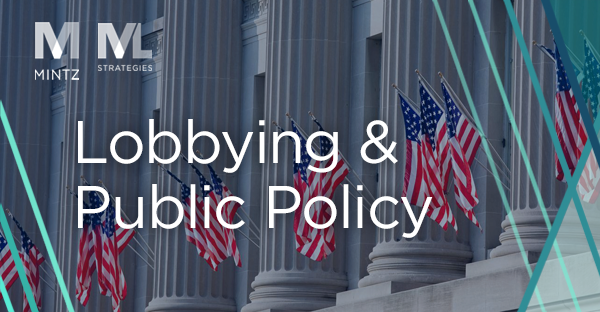Energy & Sustainability Washington Updates – September 2020
Congress was away from Washington for much of the month of August for the annual recess and is scheduled to return after Labor Day for a limited work period before breaking again to allow members to campaign ahead of the November elections.
Menezes Confirmed as Deputy Secretary of Energy
On August 4 the Senate confirmed Mark Menezes to be Deputy Secretary of Energy in a bipartisan vote of 79-16. The Senate previously confirmed Mr. Menezes as Under Secretary of Energy by voice vote in November 2017. The President nominated Mr. Menezes to be Deputy Secretary of Energy on March 12, 2020, and the Energy and Natural Resources Committee favorably reported his nomination to the full Senate by voice vote on June 9, 2020. Prior to his federal service, Mr. Menezes worked for Berkshire Hathaway Energy, the U.S. House Committee on Energy and Commerce, and American Electric Power.
Senate Democrats Release Final Report on the Climate Crisis
On August 25 the Senate Special Committee on the Climate Crisis issued its comprehensive report on the climate crisis titled “The Case for Climate Action: Building a Clean Economy for the American People.” The report calls on Congress to:
- Reduce U.S. emissions rapidly to achieve 100 percent global net-zero emissions no later than 2050;
- Stimulate economic growth by increasing federal spending on climate action to at least 2 percent of GDP annually — and ensure that at least 40 percent of the benefits from these investments help communities of color and low-income, deindustrialized, and disadvantaged communities; and
- Create at least 10 million new jobs.
Click here to read the report, a press release, and statements from supporters.
Senate Hearing on Energy Sector Cybersecurity
The Senate Energy & Natural Resources Committee held a hearing on August 5 to examine federal and industry efforts to improve cybersecurity for the energy sector, including how to improve collaboration on various cybersecurity and critical infrastructure protection initiatives. Witnesses included: Mr. Alexander Gates, Senior Advisor, Office of Policy for Cybersecurity, Energy Security & Emergency, Response, U.S. Department of Energy; Mr. Joseph McClelland, Director, Office of Energy Infrastructure Security, Federal Energy Regulatory Commission; Mr. Steve Conner, President and CEO, Siemens Energy, Inc.; Mr. Thomas F. O’Brien, Senior Vice President and Chief Information Officer, PJM Interconnection.
Prepared testimony and an archived webcast of the hearing can be found by clicking here.
2020 Democratic Party Platform
The 2020 Democratic National Convention met virtually in August to nominate former vice president Joe Biden and Senator Kamala Harris (D-CA) as its 2020 candidates for president and vice president. The DNC also released its 2020 party platform, which includes a number of goals related to energy. Stating that “We can and must build a thriving, equitable, and globally competitive clean energy economy that puts workers and communities first and leaves no one behind”, the platform states that if elected, Democrats will “use federal resources and authorities across all agencies to deploy proven clean energy solutions; create millions of family-supporting and union jobs; upgrade and make resilient our energy, water, wastewater, and transportation infrastructure; and develop and manufacture next-generation technologies to address the climate crisis right here in the United States.” The platform goes on to state that to “reach net-zero emissions as rapidly as possible, Democrats commit to eliminating carbon pollution from power plants by 2035 through technology-neutral standards for clean energy and energy efficiency. We will dramatically expand solar and wind energy deployment through community-based and utility-scale systems, including in rural areas. Within five years, we will install 500 million solar panels, including eight million solar roofs and community solar energy systems, and 60,000 wind turbines, and turn American ingenuity into American jobs by leveraging federal policy to manufacture renewable energy solutions in America. Recognizing the urgent need to decarbonize the power sector, our technology-neutral approach is inclusive of all zero-carbon technologies, including hydroelectric power, geothermal, existing and advanced nuclear, and carbon capture and storage.”
Click here to read the Democratic platform.
The Republican National Convention, also held in August, did not adopt a new party platform but reiterated support for the platform approved at the party convention in 2016 and for the policies of the Trump Administration.


